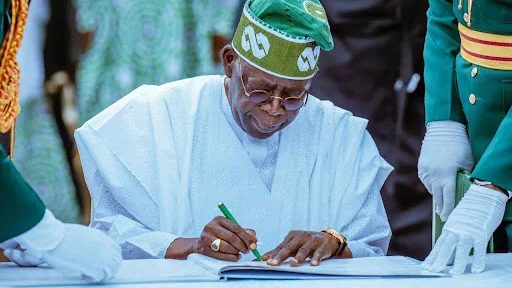In a decisive move to strengthen Nigeria’s healthcare system, President Bola Ahmed Tinubu has led the Federal Executive Council (FEC) to approve a $1.07 billion healthcare reform package under the Human Capital Opportunities for Prosperity and Equity (HOPE) program. This bold initiative comes amid significant U.S. funding cuts, particularly in HIV/AIDS treatment programs, raising concerns over Nigeria’s ability to sustain critical health interventions.
While some fear the impact of declining foreign aid, Tinubu’s strategic vision aims to reduce reliance on external funding and establish a self-sustaining healthcare system for Nigeria.
The U.S. Funding Gap: What Nigeria Stands to Lose
For years, Nigeria has depended on U.S. health aid, which averaged over $600 million annually, covering:
✔ HIV/AIDS Treatment: The PEPFAR program has supported 1.9 million Nigerians with antiretroviral therapy.
✔ Malaria Control: U.S. funding provided 83 million mosquito nets and 164 million malaria treatments in 2023 alone.
✔ Tuberculosis & Maternal Health: The U.S. has funded critical vaccinations, maternal care, and disease prevention initiatives.
However, shifts in U.S. policy have led to a gradual withdrawal of aid, creating uncertainty for millions who rely on these life-saving interventions.
Tinubu’s $1.07 Billion Health Sector Reform: A Game Changer?
Recognizing the urgency of the situation, President Tinubu’s administration has taken proactive steps to bridge the gap left by U.S. cuts. The newly approved $1.07 billion reform is set to cover:
✔ Expansion of HIV/AIDS Treatment Programs to maintain care for affected Nigerians.
✔ Increased Malaria Prevention Efforts, including mosquito net distribution and drug procurement.
✔ Strengthening Nigeria’s Primary Healthcare System to improve access to quality medical services.
✔ Boosting Local Pharmaceutical Production to reduce dependency on imported medicines.
Can Nigeria Sustain Its Healthcare System Without Foreign Aid?
While the new funding is a significant achievement, challenges remain:
U.S. aid previously covered nearly half of Nigeria’s health budget—will domestic funding be enough?
70% of Nigerians still pay out of pocket for healthcare, highlighting the need for better insurance coverage.
Corruption and mismanagement in health spending must be tackled to ensure funds reach the right channels.
A New Dawn Under Tinubu’s Leadership
Despite these hurdles, Tinubu’s decisive action signals a new era of self-reliance. By prioritizing healthcare funding and reforms, he is positioning Nigeria for long-term sustainability.
The $1.07 billion health reform is not just about filling the gap left by U.S. aid—it is about building a resilient healthcare system that serves all Nigerians. With Tinubu’s leadership, Nigeria is proving that it can stand on its own and take charge of its future.
Tags
News

